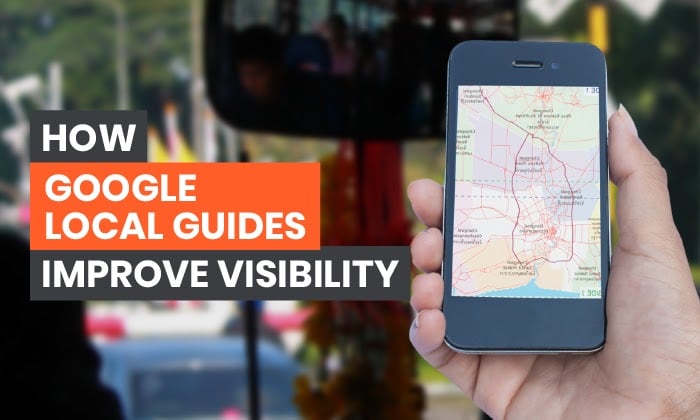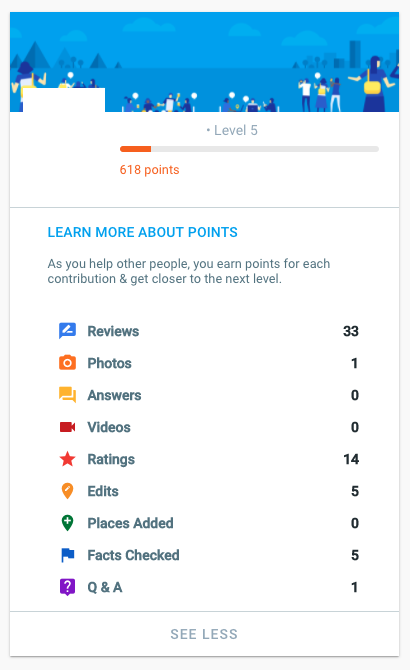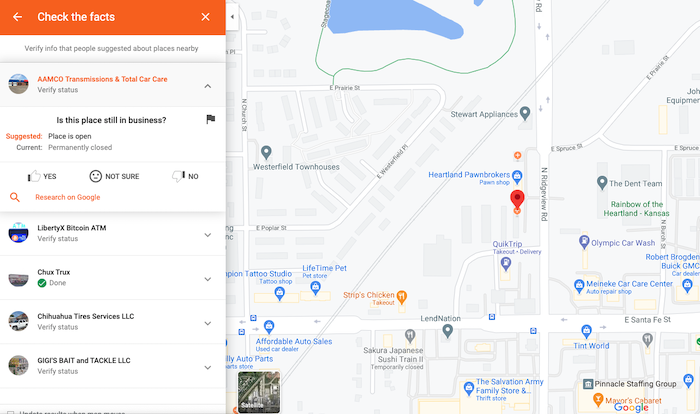
As a business owner, you know reviews and fresh content are essential to your success.
Suppose you’re passionate about promoting your business. In that case, you likely spend a lot of time creating new blog articles, crafting social media posts, or developing video content to keep your audience engaged.
But there’s another, more passive promotion method that can help grow your business and boost your local search results: Google Local Guides.
Launched in 2015, Google Local Guides—also known as Google Guides—took over where Google Cities left off. If you’re unfamiliar with it, the closest comparison is the Yelp! Elite Squad.
Google Guides allows users to add reviews and other content in exchange for various perks ranging from storage space to clothing.
Since its launch, the Google Guides community has proved hugely popular. There are 120 million local guides, spanning 24,000 cities and towns.
There are several potential benefits of Google Guides for your business and its online visibility.
Let’s take a closer look at the Guides system.
What Are Google Guides?
The idea behind Google Guides is simple. It uses user-generated content (UGC) to enrich the information available on Google Maps.
Or as Google explains it, Guides are:
… a global community of explorers who write reviews, share photos, answer questions, add or edit places, and check facts on Google Maps.
Guides’ additional content can increase your business’s visibility and make it easier for consumers to get the information they need.
Becoming a Local Guide is simple. Potential Guides sign up through their Google accounts, choose their locations, and be ready to go.
Once signed up, members of the Google Guides community receive points for each action they take.
All Guides start with zero points and work their way up through 10 levels, earning various perks along the way.
Creating Lists
Once Guides reach level four, they can start to add lists. These lists may consist of favorite places, destinations the guide plans to visit, and saved locations.
As you might expect, each list a Google Guide adds must meet specific requirements. To be eligible for publication, Google state a Guide’s list must:
- have a title (i.e., a custom list, not be included in Want To Go or Favorites);
- include a minimum of four places; and
- be shared publicly.
Google Guides Perks
One aspect that makes Google Guides appealing to its members is the perks. Although these can vary from time to time, examples of the incentives include:
- early access to new Google products
- free music trials
- discounted video services
- storage space
- partner perks
- digital newspaper subscriptions
- t-shirts and socks
Other bonuses include invitations to the Google Guides convention or Connect Live events, which are open to a limited number of community members.
There’s also an active online forum that helps fuel the community feeling and allows guides to share tips, favorite images, and other information.
How Do Google Guides Points and Levels Work?
Community members start at level one and can work their way up to level 10, which offers a maximum of 100,000 points.

To try to ensure that Guides play by the rules, Google will close an account if a Guide violates the program’s policies.
Some violations that may get a guide removed from the program include:
- participating as a business
- duplicating reviews
- spamming the site
- posting offensive content
- adding inaccurate information
- including unnecessary keywords
How Does Your Business Benefit From Google Guides?
Since you can’t take part as a business owner, you might be wondering how Google Local Guides can help you.
Let’s start with one of the most crucial elements for businesses today: getting found online.
Increased Visibility
With most consumers heading online to search for local businesses, and mobile search on the rise, increased visibility is more critical than ever before.
This is where the content Google Guides compile can prove invaluable to your business and potentially help your local search rankings.
A Google my Business Insights Study revealed that high-quality images are vital to your listing.
The survey revealed that profiles with more images receive increased clicks, queries, and inquiries for directions.
Let’s look at the stats. Businesses with over one hundred images received:
- 520% more calls than average
- 2,717% more direction requests
- 1,065% more website clicks
In addition, the research suggests several search benefits from image-rich Google My Business profiles.
Businesses with more than 100 images received:
- 960% more search views
- 3459% more map reviews
- 1038% more direct searches
Although Google Guides and Google My Business are different products, they’re closely correlated, with both providing information for Google Maps.
This insight means the more detailed information about your business on Google Maps, the higher the likelihood consumers will find you online—and offline.
The Ability to Keep Your Profile Updated and Accurate
As we explained at the start, Google awards points for editing listings.
Making sure your details are updated is imperative because inaccurate information such as out-of-date phone numbers or an old address reduces the likelihood a customer will find your business offline.
Besides editing listings for errors, Google Guides can correct omissions. This added detail is essential in attracting new customers.

Statistics from Google show that 67% of your listing visitors would not feel the need to conduct further research if the profile includes essential information such as:
- opening hours
- locations
- images
- consumer reviews
The same study shows that 41% of users who come across an incomplete profile would continue with their research and leave the business’s profile, possibly depriving the business of an opportunity to gain a new customer.
Online Reviews
You know positive reviews inspire customer trust, but they can also help you get noticed online.
In an increasingly digital world, this online validation for your business is vital because:
- 93% of consumers say online reviews affect their buying decisions
- 91% of consumers value online reviews as much as personal recommendations
- 90% of consumers will read reviews before visiting a brick-and-mortar business
Google is the first place consumers go to read reviews these days.
The search engine leads the way in online reviews, with over 60% of would-be buyers heading to Google when considering making a purchase.
Although there has been some debate about just how critical reviews are to SEO, Google confirms they play an indispensable role in local search:
High-quality, positive reviews from your customers will improve your business’s visibility and increase the likelihood that a potential customer will visit your location.
Additionally, research from Moz confirms the importance of online reviews to SEO. Their 2018 Local Search Ranking Factors report found reviews account for 15% of local ranking factors.
Dealing With Negative Reviews
No matter how dedicated you are or how well you run your business, getting a negative review at some point is almost inevitable. It can hurt you personally, and you may be concerned that it can harm your professional reputation.
Let’s try to put this fear to rest.
Despite what you may think, your business needs negative reviews. Negative reviews allow consumers to make informed decisions. They also enable buyers to understand what could go wrong during a transaction, helping manage their expectations.
Instead of worrying about potential low reviews, your best approach is to positively and objectively respond to reviews.
Ask yourself:
- Does the reviewer have a valid point?
- Is it an issue you can address to make the experience better for the next customer?
All that said, there’s one type of negative comment that may concern you more than any other: the fake review.
Unfortunately, getting unwarranted negative feedback removed from Google Guides isn’t as easy as it could be. If the review violates Google’s terms, it will likely be removed.
But there’s no reporting option for fake reviews.
The best option may be to approach a Google Guides moderator. However, that doesn’t solve the problem of potential reputational damage over fake reviews.
Business owners can expect to, but this process is often time-consuming and frustrating for business owners who’ve experienced it.
How to Get Google Guides to Engage with You
You now know the benefits of Google Guides for your business. But how do you get them to find you and engage with you?
If you want to get more actively involved, that’s an option.
Here’s how to approach it.
Take Part in Meetups
Businesses are welcome to partner with local guides for meetups, and even offer special discounts to them. Getting to know local guides is an excellent way for your business to engage with them and build relationships.
However, you’ll want to make sure that your company and the Guide adhere to Google policies. This means:
- Local Guides mustn’t accept sponsorship in return for a positive review
- Guides can’t accept payment for hosting the meetup
- if your business sponsors the meetup or provides goods or services, Google Guides must clarify this in their meetup descriptions.
Also, Google Guides at level three and up qualify to host meetups, but they must get approval first.
Optimize Your Google My Business Page
Despite the apparent advantages of optimizing Google My Business, research has found over half of local businesses hadn’t claimed their listings.
Optimize Your Business Map’s Listing
Optimizing your map doesn’t just make it easier for locals to find you; it also makes it easier for Google Guides to discover your business.
To make your site stand out, optimize your Google map listing by:
- adding imagery
- responding to reviews
- completing your profile
- keeping your profile updated
Stress the Importance of Reviews to Your Business
There isn’t anything wrong with explaining to your customers how important reviews are to your business. However, be careful about the way you approach it.
If you need some basic guidelines on getting more reviews, Google has these suggestions:
- Begin a conversation with your shoppers about reviews.
- Make leaving feedback easy.
- Share positive reviews.
- Respond to online feedback.
Conclusion
Google Guides can help you attract new interest in your business. But you may be unaware of the potential advantages of being profiled by local guides.
Businesses with an increased amount of user-generated content (UGC) stand to benefit from increased consumer confidence in their brand, enhanced trust from Google and potentially improved local search rankings.
As a result, your business may experience an increased number of queries, enhanced visibility for your goods and services, and more visits to your offline store.
Do you have experience with Google Guides? Feel free to comment below.
The post How Google Local Guides Improve Visibility appeared first on Neil Patel.
Original Entry: How Google Local Guides Improve Visibility is shared from https://neilpatel.com/blog/google-guides/ via https://neilpatel.com
Check out the original post, How Google Local Guides Improve Visibility that is shared from https://putyourfamilyfirst.wordpress.com/2020/09/21/how-google-local-guides-improve-visibility/ via https://putyourfamilyfirst.wordpress.com
No comments:
Post a Comment